Gun Control Balance
There are two sides of the issue: thus, as always, the need for balance.
We are clamoring for a “solution” to the mass school shootings. And why wouldn’t we?
Here at balanced thought, we try to stop the little monster in our stomach from taking control of our thoughts and actions, so that we are better equipped to think issues through. We know that none of us make our best choices when our little monster is controlling things. This does not make us evil, it makes us rational (or at least maybe a bit more rational).
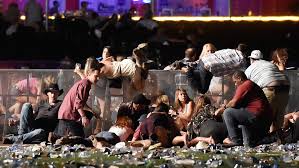
According to an article by The Washington Post , updated on 2/16/2018 to include the most recent mass shooting at Marjory Stoneman Douglas High School on 2/14/2018, there have been 150 mass shootings (four or more people killed in a single event) since what The Washington Post has marked as the first mass shooting in 1966.
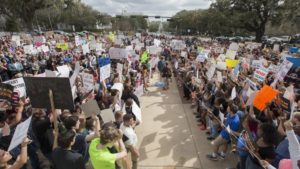
We DEMAND this stop, and now. We want ACTION, no… We demand action.
Of course we do.
We are angry.
We are afraid.
We have been attacked.
We just want this to stop.
NOW.
And our little monster is running things, which is exactly what our little monster is supposed to be doing right now.
Our little monster takes charge when we are under attack.
Our little monster defends us, helps us run fast, or freeze solid to avoid detection.
The little monster is about brain stem survival functioning, not higher thinking.
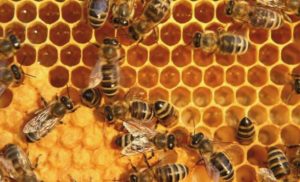
But let’s make sure we are making the best choices for the situation, not the placation of our collective little monsters. Using the data provided by The Washington Post, there have been 1,077 people killed in 150 mass shootings since 1966. That is a span of 51 years.
That means that we have averaged just over 21 deaths by mass shooting per year over those 51 years. As a point of comparison, an average of 53 to 100 or more people die in the US every year from bee stings according to The Conversation.
On average, the chances that you die of a bee sting are 2.5 to 5 times greater than the chances that you die from a mass shooting.
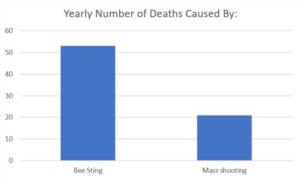
These numbers do not seem to support the current call for mass cultural action.
But, perhaps we should take the numbers from 2017, using the same Washington Post article, which states that in 2017 there were eight mass shootings that killed a total of 117 people.
The high number of deaths are impacted greatly by the Las Vegas shooting where 59 people died; just over half of the 2017 total.
The Las Vegas shooting was the worst in history, having nine more fatalities than the Pulse Nightclub shooting in 2016.
Using the 2017 numbers and the total US population in 2017 of 324,459,463 you have a .000036% chance of being killed in a mass shooting.
According to the Insurance Institute for Highway Safety, there were 37,461 motor vehicle deaths in 2016. Using 2016 US population numbers (322,179,605) you have a .01163% chance of being killed in a car accident.
This indicates that your chance of dying in a car accident is over 322 times greater than the chance of dying in a mass shooting.
Again, the numbers do not seem to point to a need for huge changes.
According to Wikipedia.org, there were “33,636 deaths due to ‘injury by firearms’” in the US in 2013.
Using the same Insurance Institute for Highway Safety resource, there were 32,719 car related deaths in 2013, with a population of 316,128,839.
With these numbers we see that your chance of dying in a car related incident, whether deliberate or accidental, is 2.8% lower than your chance of dying in a gun incident, whether deliberate or accidental.
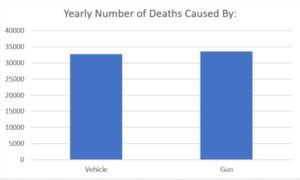
The cost of lives from guns and cars are remarkably similar. The question for society is: what is the value of cars and guns versus the risk to people?
If the argument is simply a matter of the cost in lives, and society decides that the lives are simply not worth the value of the tools, it would seem both cars and guns should be removed from our society.
But there is value in cars. We need transportation, and any and every action has inherent risk.
Is there any value in guns?

“It is a dangerous business… going out your door…” J.R.R. Tolkien
Even staying home has inherent risk. According to ASecureLife.com, there are over 18,000 deaths every year from accidents at home. Indeed, you need not even venture out your door. Being at home leads to just over half the number of deaths every year as deaths involving guns each year.
It would seem that death itself is unavoidable.
And that is the point.
We will never be able to legislate away all the risks involved with every action in life. And no, it is not fair. It never was fair, and it never will be fair.
All decisions involve trade-offs.
If you go to the movies, you spend a little money, it is going to take some of your time, you may not like the movie, you may have some kid (or adult) kicking your seat the whole time, it may be your new favorite movie. Perhaps it is the best time of your life, you meet that perfect someone, and live happily ever after.
The “if it would save one life” argument is rooted in irrational thinking that we can somehow beat death by passing laws.
We can’t.
Crazy people will do crazy things. Bad luck happens. Unfortunate timing, poor choices, accidents.
None of us gets out alive.
It is a trade off: The very essence of Balanced Thought.
How much freedom versus how much risk?
- Fireworks or no fireworks?
- Alcohol or no alcohol?
- Cars?
- Marriage Choice?
- Pilot license?
Trade-offs
Most of us understand the intrinsic value of cars. We trade some risk, grime and pollution for our ability to get around. We count on the person in the oncoming traffic not to steer into our lane. We spend money on the car, the upkeep, the gas, keeping it clean.
We get some freedom with some risk.
On balance, we as a society have decided the tradeoff for cars works, so we accepted 32,719 car related deaths in 2013. A number very close to the number of gun related deaths the same year.
But what do we gain from guns? Anything? Some enjoy hunting or sport shooting like sporting clays, skeet, birds or game.
But are the deaths, greater than the deaths from cars, worth the trade off?
Many of us are saying “no”. So why do we have the second amendment?
Were those crazy old white men that came up with this crazy constitution just, well… crazy?

Here is the counter argument, and the actual reason that the crazy white men put the second amendment into the constitution. They understood that the greatest mass killers of humans in all of human history have always been governments. From Romans killing Christians, to Hitler killing Jews, to Stalin killing an estimated 2,000,000 to 60,000,000 of his own people (Wikipedia.org).
Government has consistently been the most dangerous mass murderer in human history.
When governments kill their people, the government becomes the leading cause of death. Your chance of death by government becomes much higher than your chance of death by mass shooting sits in our society today.

We have been insulated from mass government slayings for many years. World War II seems like ancient history. Idi Amin Dada is obscure and unknown, but killed 100,000 to 500,000 of his own people in the tiny country of Uganda (Wikipedia.org) in the 1970’s. The evidence for atrocities by governments is overwhelming.
A rational trade off is already in play. We accept the risk of guns in our culture in trade for the benefit of self protection, and sport.
At Balanced Thought, we find it curious that the same people that have such lack of trust for the police, clammer for gun control.
Similarly, we find it curious that those who seem to most support the police, have the low expectation of those police in protecting them.
Can we do better? Of course. Should we try? Of course. But let’s look at all of the facts, even, and perhaps especially, those that fly in the face of our emotional responses.
Insane people will always be among us. If the standard is that we have to control every person as if they are insane, that is a quick pathway to the kind of control by the state that will allow the government to do whatever they like to their own people. Last time we checked, there are a lot of folks out there that are very unhappy with the current leadership in this country.
Do we really want to give the government that much authority?
Perhaps some balanced thought is in order.

So how about we “Charge the common ground”?
Where do we have majority agreement?
- We hate when mass shootings happen
- We would like mass shootings to stop completely
- We want mass shootings to stop NOW
- We do not want crazy people getting guns, and anyone that shoots kids at a school, even by today’s much fluid standards, still is recognized as crazy
- Both sides show some level of concern about the police. One says they are corrupt, the other says they can’t protect us.
- Both sides believe the police should engage a shooter quickly and decisively.
- One side clearly hates the current administration, while the other tends to not trust government in general.
What do the facts tell us?
- We are a society of the quick and easy. We want this solved now, period. But the devil is always in the details.
- The police are not going to be able to stop these shootings. Police respond, but the time between the start of an attack and the police arriving is deadly.
- When confronted with force, mass shooters stop, either by suicide or surrender.
- Prohibition has never eliminated any undesirable thing, but instead created black markets and the crime that goes with them. From Alcohol, drugs, or gum in middle school, prohibitions do not work in a free society.
- The odds of being killed in a mass shooting are much lower on average than the odds of dying from a bee sting.
- Government has failed from the lowest to the highest level on this and every other issue, not because government is bad per se, but because bureaucracies fail, and government is the largest bureaucracy.
What are the possible trade-offs?
Securing Schools:
Are we willing to make our schools lock down centers secured by walls (fences can be shot thru easily, so walls it is), armed guards or other staff, surveillance systems, etc? What would the costs be to build meaningful walls around every school in the country? How much would it cost to hire armed guards and or install surveillance systems? Could we spend that money more wisely? Assuming we did all these things at any cost, would they actually work?
What would the effect of these new “locked down” schools be on the psychology of our kids and our culture?
Common ground: We hate these events, we want them to stop completely, we want them to stop now.
Arming Schools:
Some have suggested arming teachers, but as most teachers are leaning left these days, is it fair to force them to participate in the armed defense of the school? Could we go with vetted volunteers, trained to handle the weapons? Would we have enough volunteers to cover the need? How and who would administer the program? At what cost? would this work? Common ground: We hate these events, we want them to stop completely, we want them to stop now.

Collecting AR-15s:
What would be involved in removing the AR -15 rifle from every current owner in the country? What would the cost be? How would the current owners react? What would be done with the guns? Who would administer the program? How long would it take? How would we know that we got them all? What would we do with the people who were unwilling to turn over their guns? How would we enforce this new prohibition and how much would that cost? What do we do about the second amendment and it’s true intention of arming the citizens against tyranny. Common ground: None.
Changing the buying age for guns:
This is an idea that already has a framework in place (although it is clear that the system is not being administered correctly). A change in the age to buy any firearm would be an adjustment and actually simplify the existing system of allowing 18 year olds to buy some guns, but make them what until they are 21 to buy others. This would be relatively easily initiated. The cost would be relatively low. The most recent shooter would not have been able to purchase a gun. Common ground: we do not want crazy people getting guns. Common ground: We hate these events, we want them to stop completely, we want them to stop now, we don’t want crazy people getting guns.
Improve the background check data:
Background check data is already collected. Improving a system is typically much less costly and time consuming than creating a new one.
Assessing the current data and looking for how bad people came to get the guns makes perfect sense. Again, it is easier to augment an existing system than build a new one. Relative to other suggestions, this would be a lower cost option. Common ground: We hate these events, we want them to stop completely, we want them to stop now, we don’t want crazy people getting guns.
Improve the background check process:
This is essentially the same as the data piece, but specific to the process. The process will not work with bad data. Assessing the current system and looking for how bad people came to get the guns makes perfect sense. Again, it is easier to augment an existing system than build a new one. Relative to other suggestions, this would be a lower cost option. Common ground: we do not want crazy people getting guns. Common ground: We hate these events, we want them to stop completely, we want them to stop now, we don’t want crazy people getting guns.
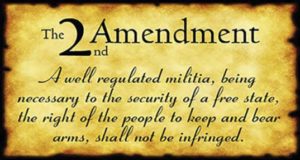
Maintain Second Amendment Rights:
This is a huge cultural battle. Oddly, the common ground points toward maintaining the right to bear arms. Common ground: Police can’t be counted on, government trust.
We have allowed our public discussions to devolve into shouting matches driven by emotions (what we at Balanced Thought call the “little monster”).
This has lowered the discussion, and removed the rational exchange of ideas in favor of ugly tribalism.
We can bridge this. We can, and should, come together.
When we see the same news repeated over and over through the new cycle, the horror of the events is amplified.
It is a nightmare that these shootings happen.
But, when we take a look at the big picture, with a clear, unemotional eye, we see that the size of the problem is not as big as our little monsters would like us to think.
Our little monsters are turning us into monsters when we interact with those who disagree with us.
We can, and should, do better.
Just a thought… a Balanced Thought.
